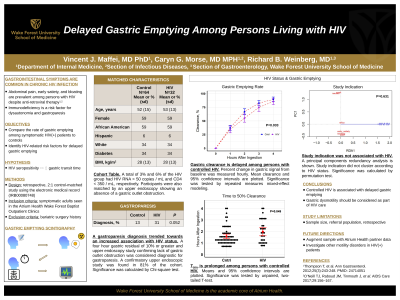Monday Poster Session
Category: Stomach
P2723 - Delayed Gastric Emptying Among Persons Living With HIV: A Control-Matched Retrospective Cohort Study
Monday, October 23, 2023
10:30 AM - 4:15 PM PT
Location: Exhibit Hall

Has Audio

Vincent J. Maffei, MD, PhD
Wake Forest University School of Medicine
Winston-Salem, NC
Presenting Author(s)
Award: Presidential Poster Award
Vincent J. Maffei, MD, PhD, Caryn G. Morse, MD, MPH, Richard B.. Weinberg, MD
Wake Forest University School of Medicine, Winston-Salem, NC
Introduction: Persons living with HIV (PLWH) commonly report chronic gastrointestinal symptoms despite the improved side effect profile of modern HIV anti-retroviral therapies. Abdominal discomfort and early satiety are prevalent among PLWH. Autonomic disorders, such as gastroparesis, are observed in acute immunodeficiency syndromes though few studies have evaluated the risk for delayed gastric emptying in symptomatic persons with stable HIV infection. We hypothesized that HIV infection increases the risk for delayed gastric emptying.
Methods: In a pilot, retrospective cohort study, we abstracted electronic medical record data from symptomatic patients who underwent gastric emptying scintigraphy (GES) for evaluation of a gastric motility disorder at the Atrium Health Wake Forest Baptist Medical Center. This cohort included adults with chronic HIV infection (N=32) prior to GES. Persons with a history of bariatric surgery were excluded. Controls without an HIV diagnosis were matched 2:1 (N=64) with cases based on demographic and historical factors including a history of upper endoscopy to rule out gastric outlet obstruction.
Results: In the HIV group, viral RNA was < 50 copies/mL in 97% and CD4+ T-cell counts >200/µL in 94% measured within 10 months of GES. Gastric emptying was prolonged in the HIV versus control group (P=0.033) over the four-hour test period. The mean time to 50% emptying (T50%) was 1.98 and 1.57 hours, respectively, in the HIV and control groups (P=0.049). An upper endoscopy to rule out gastric outlet obstruction was performed in 81% of each group. A formal diagnosis of gastroparesis was made in 31% and 13% of the HIV and control groups (X2=3.77, P=0.052), respectively. The indication for GES did not significantly differ between groups (P=0.631).
Discussion: In this pilot cohort study gastric emptying time was significantly slower in the pharmacologically controlled HIV group. In addition, the HIV group trended towards an elevated risk for a gastroparesis diagnosis without reaching statistical significance. In this limited sample, a greater risk for delayed gastric emptying among persons with HIV suggests that dysautonomia could be a potential contributing mechanism underlying chronic GI symptoms in this population. Further study is needed to evaluate the benefit of diet modification and/or pro-kinetic therapy in symptom management.
Disclosures:
Vincent J. Maffei, MD, PhD, Caryn G. Morse, MD, MPH, Richard B.. Weinberg, MD. P2723 - Delayed Gastric Emptying Among Persons Living With HIV: A Control-Matched Retrospective Cohort Study, ACG 2023 Annual Scientific Meeting Abstracts. Vancouver, BC, Canada: American College of Gastroenterology.
Vincent J. Maffei, MD, PhD, Caryn G. Morse, MD, MPH, Richard B.. Weinberg, MD
Wake Forest University School of Medicine, Winston-Salem, NC
Introduction: Persons living with HIV (PLWH) commonly report chronic gastrointestinal symptoms despite the improved side effect profile of modern HIV anti-retroviral therapies. Abdominal discomfort and early satiety are prevalent among PLWH. Autonomic disorders, such as gastroparesis, are observed in acute immunodeficiency syndromes though few studies have evaluated the risk for delayed gastric emptying in symptomatic persons with stable HIV infection. We hypothesized that HIV infection increases the risk for delayed gastric emptying.
Methods: In a pilot, retrospective cohort study, we abstracted electronic medical record data from symptomatic patients who underwent gastric emptying scintigraphy (GES) for evaluation of a gastric motility disorder at the Atrium Health Wake Forest Baptist Medical Center. This cohort included adults with chronic HIV infection (N=32) prior to GES. Persons with a history of bariatric surgery were excluded. Controls without an HIV diagnosis were matched 2:1 (N=64) with cases based on demographic and historical factors including a history of upper endoscopy to rule out gastric outlet obstruction.
Results: In the HIV group, viral RNA was < 50 copies/mL in 97% and CD4+ T-cell counts >200/µL in 94% measured within 10 months of GES. Gastric emptying was prolonged in the HIV versus control group (P=0.033) over the four-hour test period. The mean time to 50% emptying (T50%) was 1.98 and 1.57 hours, respectively, in the HIV and control groups (P=0.049). An upper endoscopy to rule out gastric outlet obstruction was performed in 81% of each group. A formal diagnosis of gastroparesis was made in 31% and 13% of the HIV and control groups (X2=3.77, P=0.052), respectively. The indication for GES did not significantly differ between groups (P=0.631).
Discussion: In this pilot cohort study gastric emptying time was significantly slower in the pharmacologically controlled HIV group. In addition, the HIV group trended towards an elevated risk for a gastroparesis diagnosis without reaching statistical significance. In this limited sample, a greater risk for delayed gastric emptying among persons with HIV suggests that dysautonomia could be a potential contributing mechanism underlying chronic GI symptoms in this population. Further study is needed to evaluate the benefit of diet modification and/or pro-kinetic therapy in symptom management.
Disclosures:
Vincent Maffei indicated no relevant financial relationships.
Caryn Morse: Gilead Sciences Inc. – Grant/Research Support. Laurent Pharmaceuticals – Grant/Research Support.
Richard Weinberg indicated no relevant financial relationships.
Vincent J. Maffei, MD, PhD, Caryn G. Morse, MD, MPH, Richard B.. Weinberg, MD. P2723 - Delayed Gastric Emptying Among Persons Living With HIV: A Control-Matched Retrospective Cohort Study, ACG 2023 Annual Scientific Meeting Abstracts. Vancouver, BC, Canada: American College of Gastroenterology.

